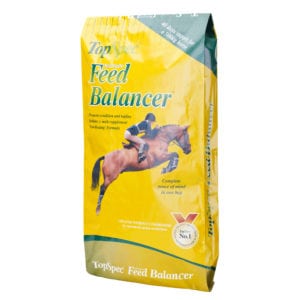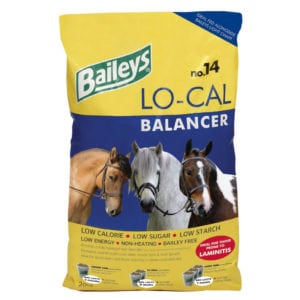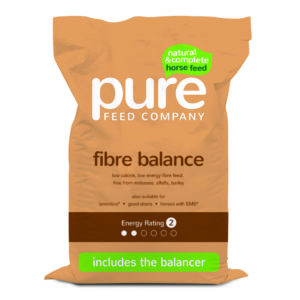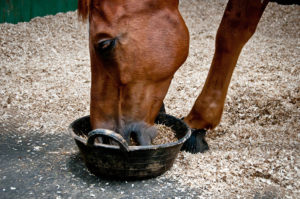What Should I Feed My Horse?
Monday 22nd August 2022
What should I feed my horse is an impossible question to answer as there is not a one size fits all approach. Each horse will have different preferences and requirements and its all about finding what is best for your specific horse. This might include some trial and error. Feeding your horse can often seem very daunting with a large amount of products that all claim to be the best and offer everything that you are looking for.
The most important component to ensure your horse is eating is roughage, this includes grass, hay, and haylage. Horses are designed to eat roughage; they are designed to be trickle fed on a low quality, energy poor feed as a primary nutrient. They have evolved a much-enlarged hindgut to provide a place for trillions of grass digesting bacteria and fungi. Forage should form the main component of all horses’ diets with the bulk of the calories coming from it.
Hay and haylage are also important when it comes to feeding horses in the winter when turnout and grass is limited. Hay is simply, heavily dried grass, meaning that there is some loss of nutrients due to the drying. Poor quality hay can also be dusty so may need steaming or soaking to remove the dust, make it more palatable and decreasing mould levels. In contrast haylage dries out much less, so it has higher levels of protein, fibre, and energy. This means that hay is more suitable for horses that are good doers as it has a reduced risk of weight gain due to lower energy values. Haylage provides much more energy which can be excessive if a horse eats too much, which can lead to weight gain or laminitis.
Hard feed and concentrates should only be fed if the forage is deficient or if the horse is in very hard work or carrying a foal. Signs that it is deficient are that the horse is not maintaining condition on forage alone. There is a wide variety of hard feed but arguably the most important hard feed are balancers. They provide horses with all the important micronutrients, to include essential vitamins, minerals, and proteins that a horse needs that they may not be getting from forage alone. Shop some of our favourite balancers below.
TopSpec Comprehensive Feed Balancer
 TopSpec Comprehensive Feed Balancer is a very flexible, nutrient-rich feed designed to balance the rations of most horses and ponies simply by adjusting the rate at which it is fed and the products it is fed with. It contains several supplements combined with a feed designed to promote muscle development and function. A broad-spectrum supplement is backed up by others including a superb hoof supplement, generous levels of anti-oxidants and sophisticated digestive aids.
TopSpec Comprehensive Feed Balancer is a very flexible, nutrient-rich feed designed to balance the rations of most horses and ponies simply by adjusting the rate at which it is fed and the products it is fed with. It contains several supplements combined with a feed designed to promote muscle development and function. A broad-spectrum supplement is backed up by others including a superb hoof supplement, generous levels of anti-oxidants and sophisticated digestive aids.
 Baileys Lo Cal balancer is a nutrient dense pellet containing all a horse or pony needs for health and well being but with a minimal calorie content. It can be fed by the mug full and can be given as the sole concentrate, providing those nutrients lacking in forage, and mixed with a little Light Chaff, if desired, to give good doers a bit more to chew on. Its low starch (under 10%) and calorie content also make it ideal for those prone to laminitis and it contains excellent levels of biotin, methionine, calcium and zinc to promote healthy hoof growth and repair. For those receiving reduced levels of other compound feeds, Lo Cal can be added to top up nutrient levels and maintain a balanced diet.
Baileys Lo Cal balancer is a nutrient dense pellet containing all a horse or pony needs for health and well being but with a minimal calorie content. It can be fed by the mug full and can be given as the sole concentrate, providing those nutrients lacking in forage, and mixed with a little Light Chaff, if desired, to give good doers a bit more to chew on. Its low starch (under 10%) and calorie content also make it ideal for those prone to laminitis and it contains excellent levels of biotin, methionine, calcium and zinc to promote healthy hoof growth and repair. For those receiving reduced levels of other compound feeds, Lo Cal can be added to top up nutrient levels and maintain a balanced diet.

Pure Fibre Balancer is a perfect feed for good doers as it provides ponies and horses with all the vitamins and minerals they need however it is a very low calorie option. It is low in both sugar and starch making it suitable for laminitis and those on a low starch diet. It also has a very high fibre content which is great for gut health. Pure Fibre Balance is also a very cost effective feed as it is recommended to be fed in smaller quantities than most feeds.
Horse owners do need to be mindful when feeding concentrate horse feeds as many feeds have high levels of starch, which horses are not designed to digest. The NRC (national research council) recommends a starch intake of below 0.2-0.5% of bodyweight per meal. Starch intakes of above this level risk horses developing health difficulties such as laminitis and ulcers. If you want to start feeding your horse concentrates make sure that you research options and consider speaking to a specialist or popping into our store for advice and to view our extensive product range.

